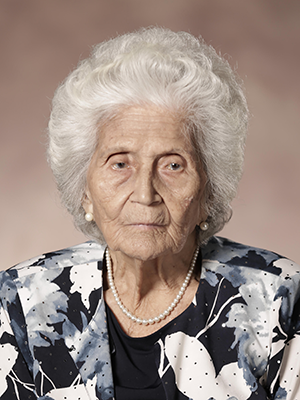A lover of songs and poetry

A lifelong lover of learning and music, Francisca Quintanilla Franquez (1920 – 2019) often found herself with a song in her heart. Whether she was teaching the parts of the coconut tree or honoring her mother, she loved to sing and recite poetry.
Franquez was born in Hagåtña to Maria Cruz Quintanilla and Ramon Toves Quintanilla (Familian Clara). With land on the Hagåtña coast and a ranch in Mongmong, the family always had plenty of fresh eggs, catfish, reef fish, and fried chicken. The second youngest in her family, Francisca had six sisters and four brothers: Rosa, Vicente, Maria, Carlos, Antonia, Carmen, Jose, Emilia, and Olympia.
Although the family was unable to afford instruments, every one of them sang. Her father, Ramon, died when Francisca was very young, so her mother, Maria, provided for the family and her siblings raised her.
Every morning, Franquez watched her mother grind corn to makes tatiyas and then fish with a long spear. A strong matriarch, Maria climbed coconut, breadfruit, and camachile trees well into her 70s to reach the best fruit.
Teacher training proved useful
While Franquez ’s older siblings worked, she and her little sister were the only ones to complete school and become teachers. At the time, Franquez saw this occupation as a way to make money for her family. Little did she know her career choice would save her life.
When the Japanese invaded Guam in 1940, they established a language school. Each village commissioner selected a teacher to learn, then teach Japanese to the CHamorus. Franquez was one of 22 teachers who lived in a dormitory for eight months of study.
They gave us a house, and two Japanese ladies, one to cook and one for the cleaning. We didn’t do anything other than going to school, and they fed us well.
Francisca Quintanilla Franquez
On weekends, Franquez was permitted to see her family who had relocated to Yigo. Because they respected the Japanese, she said the Quintanilla family had little to worry about.
When the Japanese passed, we offer them water, we offer them coffee, we offer them food, we offer them transportation using the bull cart.
They found that if they were respectful, the Japanese would treat them nicely.
While Franquez was spared many of the war’s worst hardships, her future husband, Jesus Garrido Franquez, had a very different experience as a laborer. One day he and several others were asked to bring coconut logs to build bunkers. They heard the Japanese were going to kill all of the men after they were finished. So instead they rolled all these logs down the hill at the Japanese and then ran away and survived to tell the tale.
It was one year after the war when Francisca met Jesus. She was a Girl Scout troop leader, and he was a Boy Scout scoutmaster.
We would just meet at the school, but when I saw it was getting serious, I told him to come see me at the house and meet my brother. He was always very respectful to me.
Self-studied, Jesus became Guam’s first electronic technician, and later a police officer. The couple was married in 1948 and celebrated 52 anniversaries before Jesus died in 2000.
After the war, Francisca taught CHamoru and became one of Guam’s first special education teacher.
Many CHamoru teachers do not like special ed, because they cannot punish the students. I brought from my home my sewing machine, my two-burner stove, pots and pans, and instruments from the garden. They were learning cooking and sewing. If someone misbehaves, you cannot slap them, so what I usually do is make them sit up in front and I say, you’re going to be my helper, okay you pass out the papers to the other children – keep him busy! It helped, and that’s not punishment, you’re training him. When the principal found out I was doing that, they praised me. The principal told me, ‘Mrs. Franquez if every teacher was like you, there would be no problems.’
Franquez earned her bachelor’s degree from the Territorial College of Guam in 1967. After she retired from the public school system, she continued teaching at the Academy of Our Lady and consulted the Department of Integrated Services for Individuals with Disabilities (DISID).
As a teacher she was an advocate for education and learning which didn’t stop in the classroom. Her children recalled that she taught them spelling and penmanship at home.
She was and still is a teacher at heart. She was an excellent, creative and resourceful teacher with a passion for what she did. She learned to be independent and assertive. She was tough and would stand up to any man.
Julie Franquez Perez
She also taught her children and grandchildren Japanese and CHamoru songs.
Franquez attributed her good health and long life to eating “a poor people’s diet” of chicken, fish, and vegetables, only treating herself to turkey on Christmas.
Editor’s note: Reprinted and adapted, with permission, from Guam War Survivors Memorial Foundation by Amanda Pampuro.
